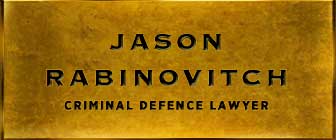Charter Applications
THE LAW
Under the Canadian Charter of Rights and Freedoms, every person in Canada is protected in their interactions with the state and its agents by a number of rights. These rights deal with all areas of life, including language, religion, mobility and privacy.
Several of these rights are of particular importance when a person is either under arrest or under investigation in relation to a criminal offence. These rights are as follows:
1. Right to life, liberty and the security of the person
2. Right against unreasonable search and seizure
3. Right against arbitrary detention
4. Right to be advised of reason for arrest/detention
5. Right to advise/instruct counsel upon arrest or detention
6. Right to a trial in a reasonable time
7. Right against cruel and unusual treatment and punishment
The right to life, liberty and the security of the person creates a protection that allows a person to interact with the state (usually police in a criminal situation) in a manner than maintains a level of fairness for the person. It includes the right to remain silent which protects a person from the potential of self incrimination. A breach of this right will occur in circumstances where the state is seen to act in a fashion which abuses the resources and power that it has at its disposal in a criminal investigation. Where a person's rights are breached under this section, the investigation and actions of the police can create an unfair trial process.
Everyone is protected against an unreasonable search of their person or property by the police or other agents of the state. In order for a search or seizure to be reasonable, the police have to be acting pursuant to statutory authority (e.g. the ability of the police to search a person incident to a lawful arrest) or judicial authorization (a search warrant issued based on proper reasonable and probable grounds). Where the search is not reasonable or is done in a manner than exceeds the police's power to search, an application can be brought to exclude that which was seized, whether it be an item or information such as a statement.
Everyone is protected against arbitrary detention. In order to detain a person for investigative purposes, the police have to have a reasonable suspicion that an offence has occurred and that the person detained is connected to the offence. The suspicion has to be based on facts to support it, and the reasonableness of the suspicion has to be both subjective and objectively present. Where the police do not have the proper grounds to detain, the individual has the rights to walk away.
Does Jason defend in my local court?
What other offences does Jason handle?

In order to arrest a person, the standard is higher. The police have to have reasonable and probable grounds to believe that the accused has committed the offence in question. These grounds need exist on both a subjective and objective basis.
When a person is being arrested or detained, the police are required to inform him of the reason for the arrest. Failure to do so deprived the accused person of being able to make an informed decision as to what they should do, and is a breach of their protected rights.
Upon arrest or detention, everyone has the right to retain and instruct counsel without delay. The right to counsel is there to allow persons to receive proper legal advice when they are facing the jeopardy of criminal charges.
When facing criminal charges, everyone has the right to a trial in a reasonable period of time. This time period is based on an analysis of the total time to trial taking into account the reasons behind any specific delay and the prejudice suffered by the accused as a refuge if the delay.
While in police custody, everyone is protected by law against cruel and unusual treatment or punishment. This could mean the manner in which the police deal with the individual. Examples could include improper strip searches, improper interrogation techniques or physical violence by the police. It also protects against sentences that are unduly harsh given the circumstances of the offence and the offender.
Whenever a Charter breach is alleged, the burden is on the accused to prove to the Court on a balance of probabilities (more likely than not) that a Charter breach has occurred. Where the court finds that there has been a breach, the accused must then convince the Court if the appropriate remedy. This could include exclusion of evidence, a lessening of a sentence or in the most extreme cases, a stay of proceedings.



